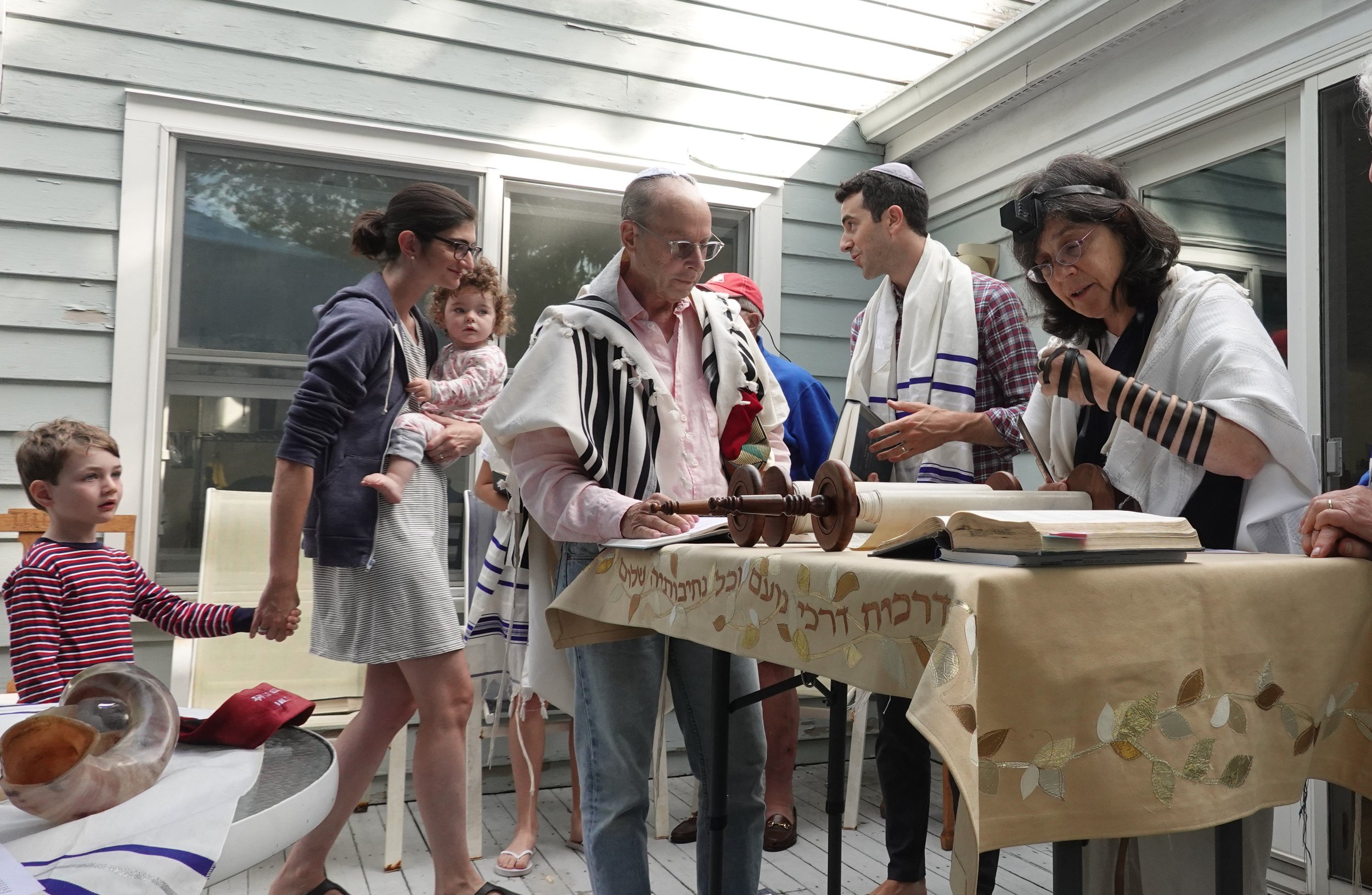
Torah at the Bridge Shul
Our Approach to Torah
We understand Torah as a dynamic, living document, one that is interpreted and reinterpreted by every generation. We approach with love and awe the teachings that have guided Jewish life for two millennia.
We understand Torah as an ongoing conversation. We enter with questions and curiosity. We study with others, listening, reflecting, and joining our own thoughts, and inner moral compass, to centuries-long dialogues. The Torah is the prompt to our probings about what it means to lead a Jewishly informed life in which our ethical, social and spiritual concerns permeate our daily practices.
We understand Torah as pointing to a Divine dream, helping us to imagine a loving, just, kind, peaceful human future toward which we aspire. We are honored to add our voice to the Torah that will be passed down to the next generation.
“Rabbi Uhrbach’s unique combination of intelligence, spirituality, and compassion, coupled with an incredible gift of communication, enables her to teach us, from a Jewish perspective, and beyond, how to better bridge the innumerable chasms that we all regularly face, leading to a more profound and tolerant understanding of ourselves, and the world around us. Nobody does it better!”
Three bridges to Torah…
Learn with Rabbi Uhrbach…
The best time to catch Rabbi Uhrbach’s teaching is at Shabbat services, briefer on Friday night and more expansively Shabbat morning. Week after week, we’re privileged to hear provocative, personally and communally relevant, psychologically informed Torah that addresses the most pressing issues of our lives.
Then stay for the lively, informal conversation after the formal service: ask questions, hear others’ thoughts, reflect on your own. The question you had during the service about a particular prayer, the thought that came to you during the week’s Torah portion, or a troubling turn in world events you want to view through a Jewish lens, may all become part of these compelling discussions.
Or join the weekly summer study group — a different subject each summer, great conversation every time.
God’s Partner in Torah: Us
(from the Tikkun Leil Shavuot 2023, jointly with Temple Adas Israel and the Jewish Center of the Hamptons)
The ancient rabbis struggled with the same questions we do: what is the nature of God’s relationship to us? why do humans suffer, and commit evil? what is the basis for the religious authority of Torah, and what do we do when it seems to cause harm? Through juxtaposing a traditional story from the Talmud with a rewriting of it by contemporary Israeli woman scholar, we’re all invited into the conversation.
Download the source sheet.
God of the Faithful, God of the Faithless: Belief and Doubt in Prayer
(a teaching for JTS)
Do we need “faith” in order to pray? Can synagogue services be worthwhile and meaningful even if we’re not sure what we believe? We are hardly the first generation to struggle with contradictions among our intellectual beliefs, traditional Jewish liturgy, and the act of prayer. What do biblical and rabbinic texts about prayer, and the prayerbook itself, teach us about these conflicts, and how can they help us connect to prayer even in times of doubt or faithlessness?
Download the source sheet.
Learn through music…
Rabbi Michael Boino - Psalm 29
We understand that Torah can be acquired not only through the language of words, but also through silence, tears, laughter, the human gaze, and most especially… through music. At The Bridge Shul, we’re privileged to have a rabbi/composer/musician whose beautiful music is truly transformative.
“The music Rabbi Boino brings on Shabbat — his own compositions and the musical choices he makes — carry me through the week. Every morning, as I walk the beach, I hear his music in the ocean’s chorus as the waves roll ashore. It is one of the most prayerful, meditative moments I have each day.”
Learn with a visiting scholar…
Each summer, we focus on one or two exceptional teachers for special scholar-in-residence weekends. We invite teachers who are not only learned, but whose Torah speaks deeply to the human condition and our own experience.
In past years, we’ve hosted such luminaries as:
Rabbi Neil Gillman, Prof Zvi Gitelman, Dr. Meilila Helner-Eshed,
Rev Lisa Jenkins, Dr. Joy Ladin, and Rabbi Chaim Seidler-Feller;
former JTS Chancellors Dr. Arnie Eisen and Dr. Ismar Schorsch;
Artists-in-Residence Elad Kabilio and Danny Maseng.
This year we’re thrilled to welcome
Scholars-in-Residence:




